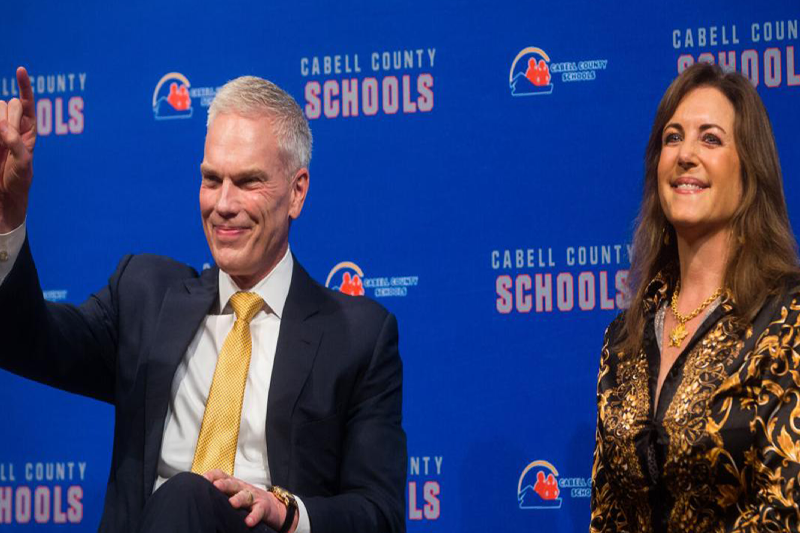
Marshall University President Donates $50 Million to Eliminate Student Debt.
In a historic move that has captured national attention, Marshall University President Brad D. Smith and his wife, Alys Smith, have pledged $50 million to support student debt elimination. This unprecedented contribution — the largest in the university’s history — aims to transform the future of higher education at Marshall, ensuring that thousands of students can pursue degrees without the overwhelming burden of loans.
A Landmark Gift in Higher Education
Announced on September 17, 2025, the donation stands out not only for its size but also for its significance. According to the Associated Press, this is the most significant gift a sitting university president has ever made to their institution.
The funds will directly support the Marshall For All programme, a groundbreaking initiative that allows students to graduate with a bachelor’s degree without taking out student loans. Combining scholarships, grants, work opportunities, and family contributions, the programme seeks to make higher education more accessible, equitable, and sustainable.
How the Marshall For All Programme Works
The Marshall For All initiative currently operates along two tracks:
- Full Coverage for Low-Income Families
- Students from West Virginia whose family income is below $65,000 qualify for full coverage of tuition and fees.
- Students from West Virginia whose family income is below $65,000 qualify for full coverage of tuition and fees.
- Debt-Free Pathway with Work Experience
- A separate track offers students the chance to graduate debt-free while gaining real-world work experience.
- This opportunity is available to a randomly selected group of eligible students from West Virginia and neighboring counties near the Huntington campus.
Together, these two pathways demonstrate the programme’s commitment to removing financial barriers and preparing students for career readiness.
Long-Term Vision: Debt-Free Education for All
Marshall University’s broader vision is ambitious: by its bicentennial year in 2037, the institution aims to ensure that all students can graduate without debt.
At present, Marshall serves nearly 10,000 undergraduate students and 3,000 graduate students. University leaders believe this gift will accelerate progress toward the bicentennial goal and expand opportunities for a wider student base, particularly those in Appalachia who face significant socioeconomic challenges.
Leadership Praises the ‘Transformative’ Gift
Reactions to the Smiths’ donation have been overwhelmingly positive. Nico Karagosian, President and CEO of the Marshall University Foundation, described the gift as “transformative.”
He emphasized that the funds will be carefully managed and allocated in alignment with the university’s strategic objectives. “This donation has the potential to reshape the educational landscape for generations of students,” Karagosian noted.
A President with a Vision and a Personal Story
Brad D. Smith is Marshall University’s president and a visionary leader with a unique professional background. Before joining Marshall in January 2022, he was the CEO of Intuit, the software company best known for financial tools like QuickBooks and TurboTax.
Smith’s connection to education is deeply personal. He launched the Marshall For All initiative during his investiture ceremony in 2022 on his late father’s birthday. The program, he explained, was inspired by his parents’ sacrifices to ensure that he and his brothers could attend college.
“My parents made a promise that we would all get the chance to earn a degree,” Smith recalled. “They fulfilled it through their own hard work and sacrifice. This initiative is about paying that forward.”
Donors’ Focus: Impact on Appalachia
In a joint statement, Brad and Alys Smith expressed their motivation behind the historic gift:
“We are honoured to support Marshall University and the Marshall For All programme with this gift. Our ‘why’ is simple: to level the playing field in West Virginia and Appalachia.”
Their commitment goes beyond higher education access. By targeting underserved regions like West Virginia and neighboring Appalachian counties, the donation seeks to reduce generational poverty, boost workforce readiness, and strengthen local economies.
What the Gift Means for Students
For students, this donation represents more than just financial relief. It translates into:
- Reduced financial stress: Fewer students will need to rely on high-interest loans.
- Greater access to higher education: Families hesitant about affordability may confidently pursue college.
- Work-integrated learning opportunities: The debt-free track with career placements ensures that graduates leave Marshall with both a degree and professional experience.
- Equity in education: By focusing on low-income and regional students, the initiative reduces systemic disparities in access.
The Larger Conversation: Debt-Free College in the U.S.
The Smiths’ contribution also highlights a growing national conversation about student debt. Across the U.S., student loan debt has surpassed $1.7 trillion, affecting millions of families. By setting an example through private philanthropy, Marshall University demonstrates how innovative funding models can complement public policy efforts to address this crisis.
While many universities rely on federal and state aid programs, Marshall’s Marshall For All model combines institutional leadership, donor generosity, and community partnerships — a framework that could inspire similar initiatives at other institutions.
Looking Ahead
As Marshall moves forward, the $50 million gift is expected to accelerate expansion of the programme, extending access to more students and strengthening the university’s mission.
University leaders remain committed to scaling the initiative until the bicentennial vision is realized — a debt-free future for every Marshall student.
Conclusion: A Legacy of Opportunity
Brad and Alys Smith’s historic donation is more than a financial gift — it is a bold statement about the future of education, equity, and opportunity in Appalachia. By directly addressing the burden of student debt, the initiative promises to change lives, uplift communities, and redefine the role of higher education in driving social and economic progress.
For Marshall University, this moment marks the beginning of a new chapter where access, affordability, and ambition come together to create a legacy that will inspire students for generations to come.


